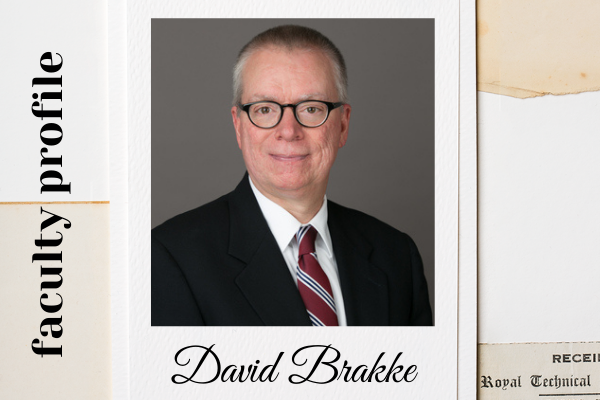Faculty Q&A Spotlight: David Brakke

What is your favorite class to teach? Why?
My favorite course would probably be History 2220, “Introduction to the History of Christianity.” This course includes materials from the first century CE to the twenty-first century and from all over the world. Even students who know a lot about Christianity usually don’t know, for example, that Christians reached China by the 600s and developed a distinctly Chinese theology. Almost always there are events in the news that this course helps us to understand.
Tell us about your current research.
Recently I have been working on literature that survives from “heretical” Christians of the second and third centuries, especially the Gnostics. I created a second expanded edition of the major sourcebook in the field, The Gnostic Scriptures by Bentley Layton, which will appear from Yale University Press in May 2021. I just finished a book on The Gospel of Judas, a Gnostic work from the second century that was first published only fifteen years ago (in 2006). In my view this new gospel provides important new evidence for how Gnostic Christianity emerged and interacted with so-called “proto-orthodox” groups. This book will be published in the Anchor Yale Bible series from Yale University Press later this year or in early 2022. As these projects come to an end, I’m returning to one of my other major interests, Christian monasticism in late antique Egypt.
How did you first get started in the field of history? What inspired you?
I am one of the select few faculty members in the department who has no degree in history. As an undergraduate English major, I became interested in early Christian literature thanks to a class on the New Testament, which inspired me to do graduate study in theology and religious studies. I then became fascinated by the variety of languages and cultures of ancient Christians—not only those who spoke Greek or Latin in the Roman empire, but also those who spoke Syriac in Persia or Coptic in southern Egypt. I have always been a historian because I use historical methods to reconstruct the distant past, but my true intellectual passion is the study of religion and religious literature.
What’s a fun fact about you that we might not know?
When I was reviewed for tenure back in the 1990s at Indiana University, one of the external reviewers of my case was Rowan Williams, then a professor at Oxford. He later became Archbishop of Canterbury. I suspect that I may be the only faculty member in the Big Ten whose tenure was assessed by an Archbishop of Canterbury.
What do you do for entertainment in your “down time” (during COVID or non-COVID)?
My usual pastimes are reading, travel, theatre, and eating out. During the pandemic I have been reading novels and works of history unrelated to my field of study, and we’ve been doing a lot of takeout from local restaurants, which need our support. I look forward to returning to a more normal life and, for instance, getting on an airplane.
